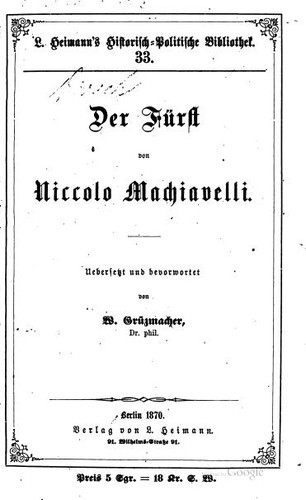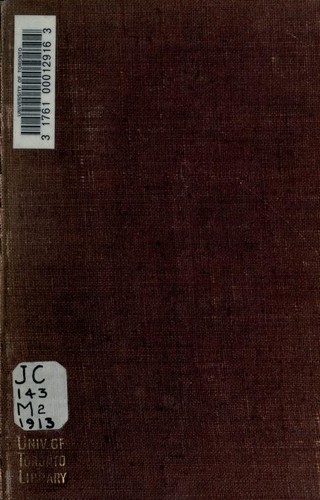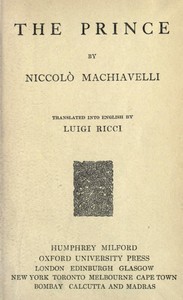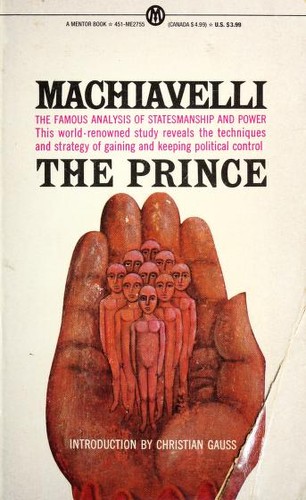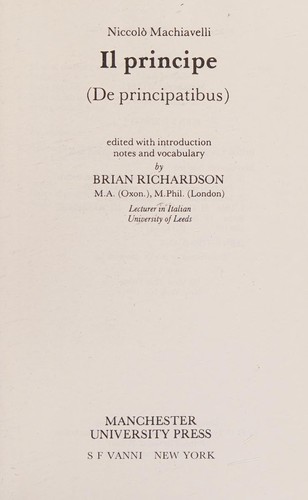The Prince
By Niccolò Machiavelli

"The Prince" was published by Bantam Dell in January 2003 - New York, USA, it has 176 pages and the language of the book is English.
“The Prince” Metadata:
- Title: The Prince
- Author: Niccolò Machiavelli
- Language: English
- Number of Pages: 176
- Publisher: Bantam Dell
- Publish Date: January 2003
- Publish Location: New York, USA
“The Prince” Subjects and Themes:
- Subjects: ➤ Political science, early works to 1800 - Machiavel, Nicolas, 1469-1527. Prince - Classic Literature - Fiction - Ouvrages avant 1800 - Science politique - Morale politique - Political science - Early works to 1800 - Political ethics - Italian literature - Contribution à la philosophie politique - Biographie - Politique et morale - Philosophie politique - Philosophie de la Renaissance - History - The Renaissance - Catholic Church - Church and State - Literature - Early works to 1700 - Industrial management - Politics - Philosophy - Political leadership - Politics and government - Republicanism - The State - Translations into English - Utopias - Doctrines - Sources - Social contract - Reformation - Staatkunde - Monarchie - Readers - Italian language - Historiography - Literature in Spanish - Ética política - Ciencias políticas - Obras anteriores a 1800 - Estado - Italian language materials - Management - Essays - Government - General - National - Reference - Principe (Machiavelli, Niccolò) - Political science, philosophy - Ciencias politicas - Education of princes - Italian Manuscripts - Facsimiles - Political science--Philosophy--Early works to 1800 - Political ethics--Early works to 1800 - State, The--Early works to 1800 - State, the - Long Now Manual for Civilization - Heerschappij - Olasz - Allamelmelet - Machiavellizmus - Political sciences - Police ethics - Philosophy and ethics - Fiction, psychological - Comics & graphic novels - fantasy - Machiavelli, niccolo, 1469-1527 - Principe (Machiavelli, Niccolò̀) - Jun zhu zhi - Zheng zhi si xiang shi - Yan jiu - History and criticism - Power (social sciences) - Monokratie - État - Machiavelli, Niccolò - Il principe - Staatskunst - Political science--early works to 1800 - Jc143 .m38 1999b - 320.101 - Jc143 .m38 1984 - Jc143 .m38 1999 - 320.1 - Jc143 .m3813 1995 - Rome, historiography - Interpersonal relations - Military art and science - Psychology - Kunshuseiji - Kings and rulers - Duties - Política - Philosophie - Princes - Monarchy - Politique et gouvernement - War - Pouvoir (Sciences sociales) - Républicanisme - Rois et souverains - Rulers (people) - Tsars - Royalties (compensation) - Kings (people) - Large type books - Contributions in political science
- People: ➤ Niccolò Machiavelli (1469-1527) - Niccolo Machiavelli (1469-1527) - Cesare Borgia (1475-1507) - Louis XII King of France (1462-1515) - Alexander VI Pope (1431-1503) - Francesco Sforza Duke of Milan (1401-1466) - Scipio Africanus (ca. 236-183 BC) - Hannibal (247-182 BC) - Alexander the Great (356-323 BC) - Agathocles Tyrant of Syracuse (361-289 BC) - Titus Livius
- Places: ➤ Italy - Milan - Venice - Naples - Papal States - Rome - Syracuse - France - Spain - yi da li
- Time: ➤ 1273-1517 - 1328-1589 - 16th century - Early works to 1800 - To 1700 - 16. sz - zhong shi ji
Edition Specifications:
- Format: Paperback (Mass Market)
- Weight: 91 grams
- Dimensions: 17.4 x 10.5 x 1 centimeters
- Pagination: vii, 166
Edition Identifiers:
- The Open Library ID: OL58076670M - OL1089297W
- Online Computer Library Center (OCLC) ID: 52074257
- ISBN-13: 9780553212785
- ISBN-10: 0553212788
- All ISBNs: 0553212788 - 9780553212785
AI-generated Review of “The Prince”:
"The Prince" Table Of Contents:
- 1- The Prince
- 2- The Kinds of Principalities and the Means by Which They Are Acquired
- 3- Hereditary Principalities
- 4- Mixed Principalities
- 5- Why Alexander's Successors Were Able to Keep Possession of Darius' Kingdom after Alexander's Death
- 6- How to Govern Cities and Principalities That, Prior to Being Occupied, Lived Under Their Own Laws
- 7- Concerning New Principalities Acquired by One's Own Arms and Ability
- 8- Concerning New Principalities Acquired with the Arms and Fortunes of Others
- 9- Concerning Those Who Become Princes by Evil Means
- 10- Concerning the Civil Principality
- 11- How the Strength of All Principalities Should Be Measured
- 12- Concerning Ecclesiastical Principalities
- 13- Concerning Various Kinds of Troops, and Especially Mercenaries
- 14- Concerning Auxiliary, Mixed, and Native Forces
- 15- A Prince's Concern in Military Matters
- 16- Concerning Things for Which Men, and Princes Especially, Are Praised or Censured
- 17- Concerning Liberality and Parsimony
- 18- Concerning Cruelty: Whether It Is Better to Be Loved Than to Be Feared, or the Reverse
- 19- In What Way Princes Should Keep Their Word
- 20- How to Avoid Contempt and Hatred
- 21- Whether Fortresses and Many Other Expedients That Princes Commonly Employ Are Useful or Not
- 22- What a Prince Must Do to Be Esteemed
- 23- Concerning the Prince's Ministers
- 24- How to Avoid Flatterers
- 25- Why the Princes of Italy Have Lost Their States
- 26- Concerning the Influence of Fortune in Human Affairs, and the Manner in Which It Is to Be Resisted
- 27- An Exhortation to Free Italy from the Hands of the Barbarians
- 28- Discourses Upon the First Ten Books of Titus Livy
- 29- 2. Of the Various Kinds of States and of What Kind the Roman Republic Was
- 30- 3. The Events That Led to the Creation of the Tribunes of the Plebs, by Which the Roman Republic Became More Perfect
- 31- 4. That the Disorders Between the Plebs and the Senate Made the Roman Republic Strong and Free
- 32- 10. Founders of Republics and Kingdoms Are As Much to Be Praised As Founders of Tyrannies Are to Be Censured
- 33- 11. On the Religion of the Romans
- 34- 12. The Importance with Which Religion Must Be Regarded and How Italy, Lacking It, Thanks to the Church of Rome, Has Been Ruined
- 35- 58. The Multitude Is Wiser and More Constant Than a Prince
- 36- 2. The People the Romans Had to Fight, and How Obstinately They Defended Their Freedom
- 37- 21. How It Happened That Hannibal Gained the Same Results in Italy As Scipio Did in Spain by Contrary Means
- 38- 41. That One's Country Ought to Be Defended, Whether with Shame or Glory, by Whatever Means Possible
Snippets and Summary:
Those who wish to win favor with a prince customarily offer him those things which they hold most precious or which they see him most delight in.
"The Prince" Description:
The Open Library:
Here is the world's most famous master plan for seizing and holding power. Astonishing in its candor, The Prince even today remains a disturbingly realistic and prophetic work on what it takes to be a prince... a king...a president. When, in 1512, Machiavelli was removed from his post in his beloved Florence, he resolved to set down a treatise on leadership that was practical, not idealistic. The prince he envisioned would be unencumbered by ordinary ethical and moral values; his prince would be man and beast, fox and lion. Today, this small sixteenth-century masterpiece has become essential reading for every student of government, and is the ultimate book on power politics.
Read “The Prince”:
Read “The Prince” by choosing from the options below.
Search for “The Prince” downloads:
Visit our Downloads Search page to see if downloads are available.
Find “The Prince” in Libraries Near You:
Read or borrow “The Prince” from your local library.
- The WorldCat Libraries Catalog: Find a copy of “The Prince” at a library near you.
Buy “The Prince” online:
Shop for “The Prince” on popular online marketplaces.





